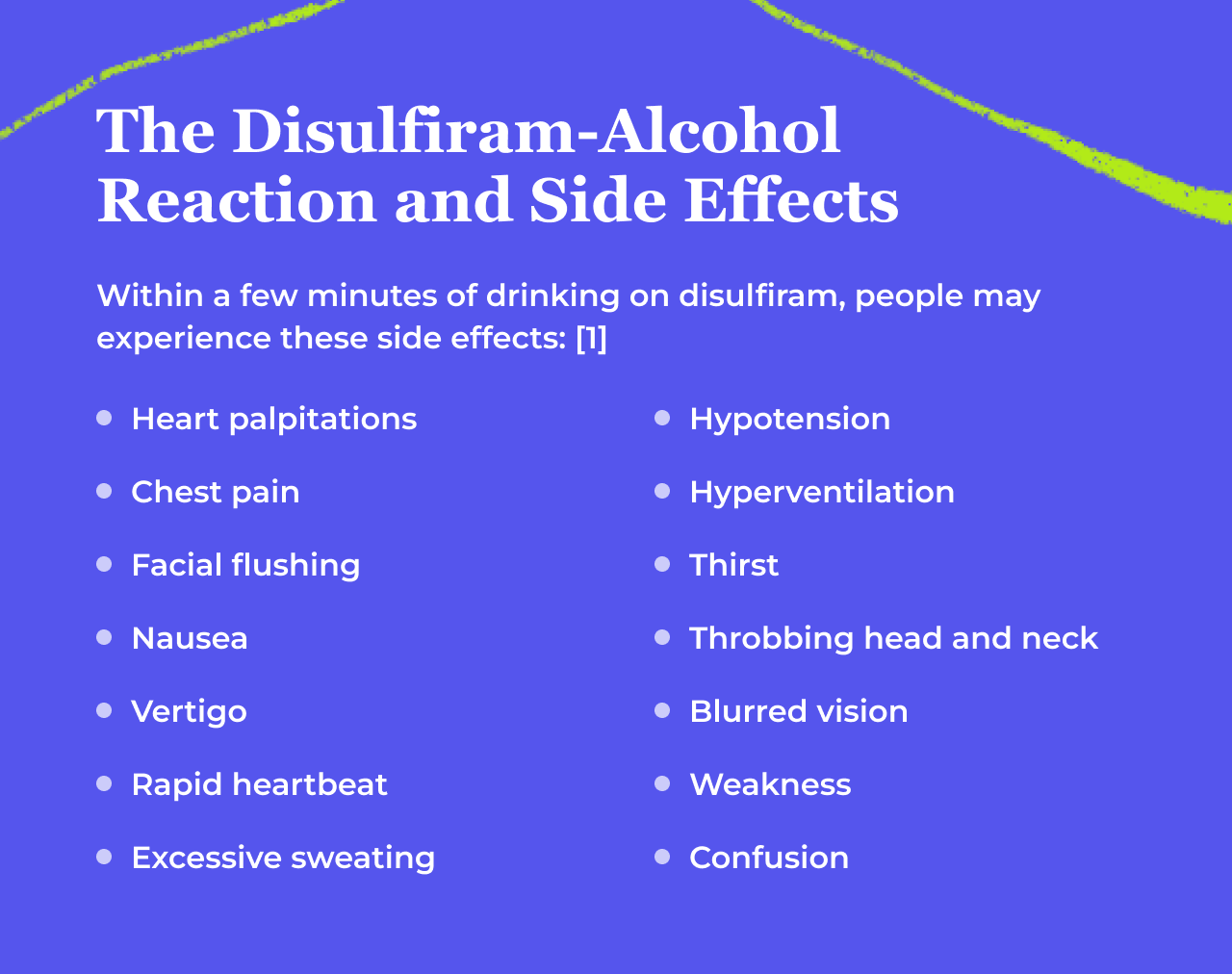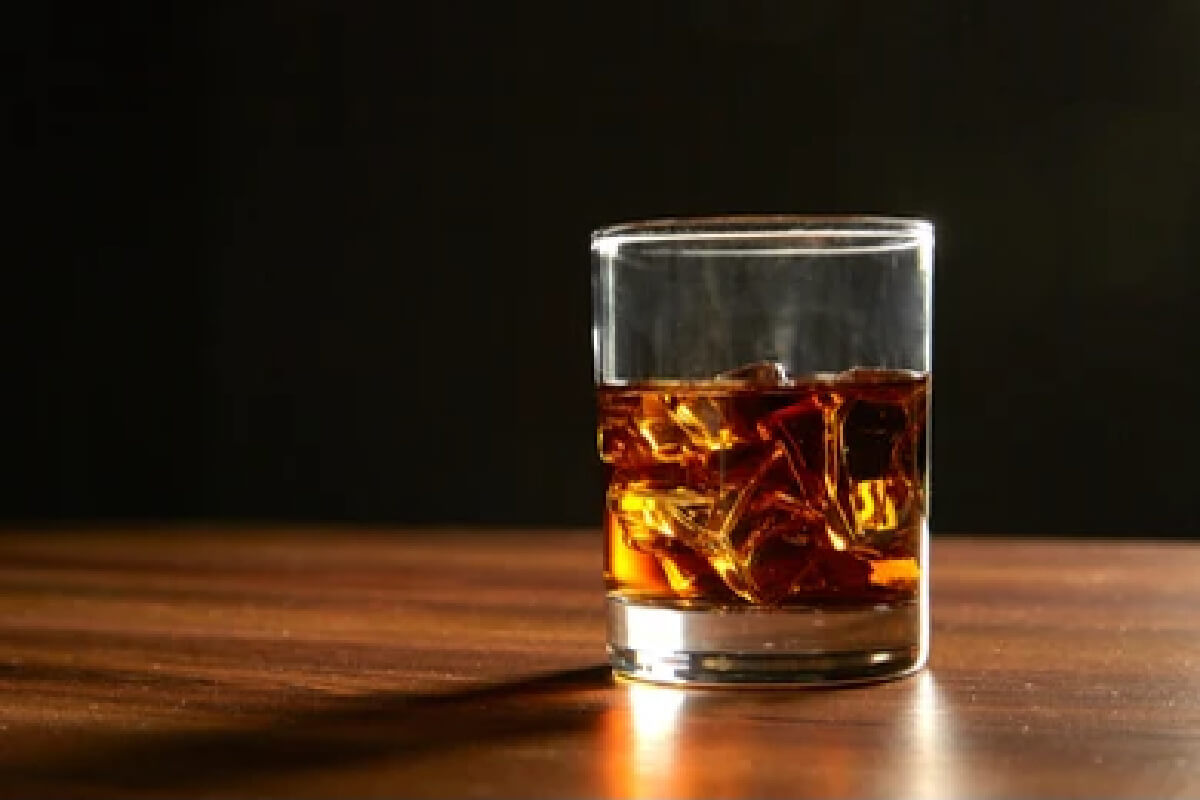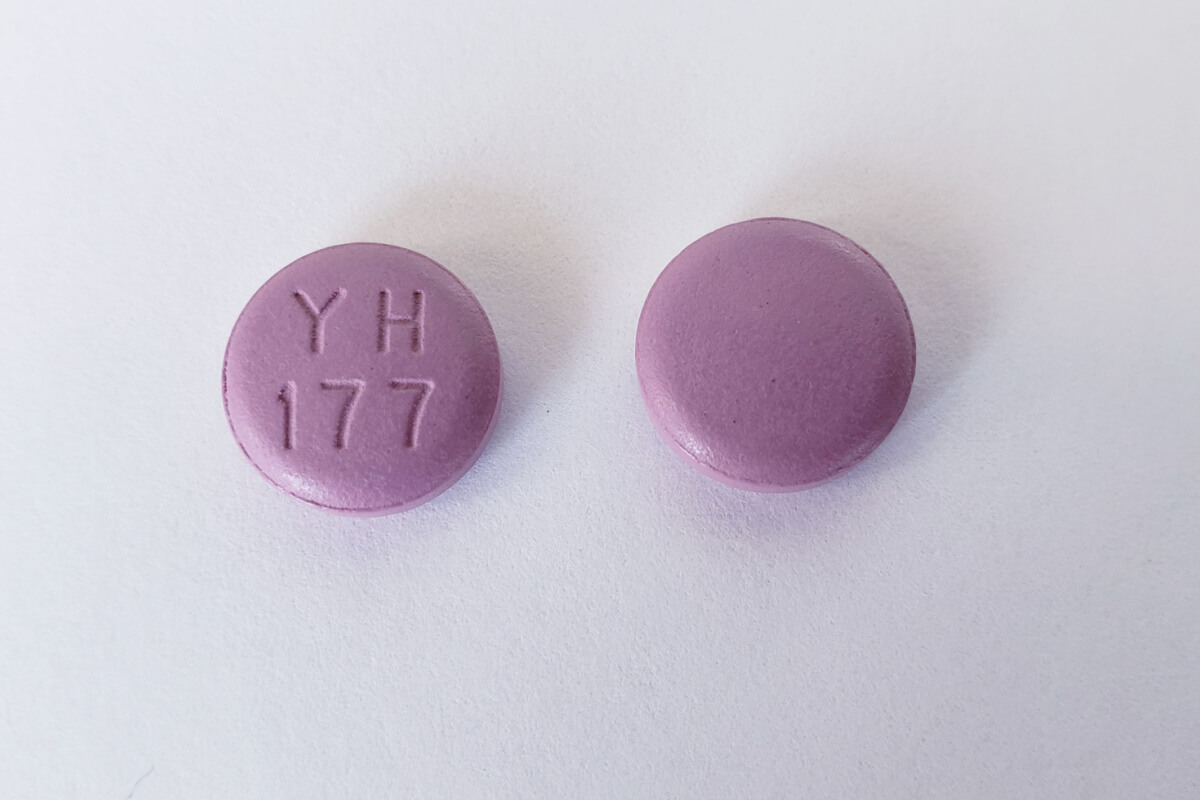
Disulfiram (Antabuse) is an FDA-approved Medication for Addiction Treatment (MAT) used to treat alcohol use disorder (AUD). If someone who is taking disulfiram drinks alcohol, they will experience unpleasant side effects, such as flushing and heart palpitations. Over time, this distressing reaction can deter alcohol use and break the association between drinking and reward. [1]
Disulfiram (Antabuse) Side Effects Brought On By Drinking

Under typical circumstances, when a person drinks alcohol, their body converts it into acetaldehyde and then acetic acid. However, Antabuse blocks acetaldehyde from turning into acetic acid, causing a buildup of this toxic chemical in the body and making the person feel very sick. [1]
Within 10-30 minutes of drinking on disulfiram, people may experience these side effects: [1], [2], [3]
- Heart palpitations
- Chest pain
- Facial flushing
- Nausea
- Vertigo
- Rapid heartbeat
- Excessive sweating
- Hypotension
- Hyperventilation
- Thirst
- Throbbing head and neck
- Blurred vision
- Weakness
- Confusion
These symptoms are often referred to as the “disulfiram-alcohol reaction.” The intensity and severity of disulfiram side effects are directly proportional to the Antabuse dose and amount of alcohol consumed. So if you binge drink while taking this medication, you may experience significant and even dangerous side effects. [1]
Those who continue drinking heavily despite the unpleasant Antabuse-alcohol reaction may experience life-threatening consequences, and deaths have been reported, though they are rare nowadays due to ongoing supervision and support. [1],[3]
How Long Does Disulfiram Stay In Your System and Interact with Alcohol?
Disulfiram can stay in your system for up to 14 days after you stop taking this medication, which means that you need to wait at least two weeks before drinking alcohol again. [1] Some sources warn that you should wait even longer—three weeks—before consuming alcohol in case of a disulfiram-alcohol reaction.[2]
Disulfiram can stay in your system for up to 14 days after you stop taking this medication, which means you should wait at least two weeks before drinking alcohol again.
Other Antabuse Side Effects
Even if you don’t drink while taking disulfiram, you may still experience some side effects of this medication, such as: [1],[2]
- Jaundice (yellowing of the whites of eyes or skin)
- Eye pain
- Dizziness
- Pain or tingling in hands and feet
- Reduced sexual desire
- Skin rash
- Headache
- Bad breath or metallic taste
- Mood changes like paranoia or depression
- Changes in vision
- Fatigue and drowsiness
If you are avoiding alcohol while on Antabuse and are experiencing significant side effects, talk to your doctor—they may adjust your dose or switch you to a different MAT option like naltrexone or acamprosate.
Some serious adverse effects may include: [1]
- Hepatitis
- Seizures
- Psychosis
- Optic neuritis
- Peripheral neuropathy
- Liver damage
- Memory impairment
Many of these adverse effects are life-threatening and should be treated as a medical emergency—call 911 immediately.
Allergic Reactions
In rare cases, someone may have an allergic reaction to Antabuse. After you take your first dose, you might notice that it’s hard to breathe, and your throat or face may be swollen. You may also have a thick and red rash on your face or arms. [2]
This is a medical emergency. Get help immediately.
Cross Contamination
Some substances or chemicals may contain enough alcohol to cause an unpleasant Antabuse-alcohol reaction. Make sure to avoid these while taking disulfiram: [2]
- Certain liquid medications
- Toiletries
- Perfumes
- Alcohol-free wine and beer
Read labels carefully and don’t use anything that contains alcohol.
Antabuse Drug Interactions
Besides alcohol, you should also avoid certain medications while taking Antabuse, such as: [1]
- Diazepam
- Omeprazole
- Acetaminophen
- Chlordiazepoxide
- Phenytoin
- Imipramine
- Amitriptyline
Antabuse Contraindications: Who Should Not Take it?
The medication isn’t right for you if you have a history of heart disease.[4] If you’ve ever been diagnosed with heart or vascular problems, talk to your doctor before filling your prescription.
Disulfiram may not be right for you if you’ve ever had any of the following:[5]
- Brain damage
- Diabetes
- Epilepsy
- Kidney disease
- Liver disease
- Thyroid disease
Additionally, individuals with impaired judgment or experience severe impulsivity due to cognitive impairment or mental health condition may not be recommended to take disulfiram. [3]
Who Is a Good Candidate for Disulfiram Treatment?
Nowadays, doctors tend to use two other medications—naltrexone and acamprosate—more commonly than disulfiram to treat alcohol use disorder because of the greater efficacy and tolerability of these medications. These medications decrease cravings for alcohol, whereas disulfiram mostly just causes unpleasant side effects when a person does drink on the medication.[3]
For this reason, disulfiram has fallen out of favor as a first-line treatment for AUD. However, some patients have been on disulfiram in the past and find it helpful. Other patients may not be able to have medications like naltrexone because of liver disease. These are a few situations in which you and your doctor might choose disulfiram instead of the other medications for AUD.
Disulfiram is also considered effective for people who have gone through alcohol detox or are in the early stages of recovery. It’s especially beneficial when the patient is highly motivated to quit and receives ongoing care and therapy. [3]
Your doctor can help you decide if medications could be helpful as you work on fighting your alcohol misuse issues. With the right medication and support, you can leave alcohol misuse in your past.
Antabuse for Alcohol Use Disorder
If you have a history of alcohol misuse, your doctor may prescribe you disulfiram, or Antabuse.
Antabuse (sold under the generic name “disulfiram”) can break the cycle of alcohol dependence and deter drinking. But this medication comes with significant side effects everyone should know about, especially if you continue drinking while taking it.
Nowadays, naltrexone and acamprosate are newer medications and are more commonly prescribed for AUD. However, for some individuals who have had good success with disulfiram (Antabuse) in the past, or who cannot have naltrexone or acamprosate for other reasons, Antabuse might be a good choice for AUD.
How Is Antabuse Used?
If your doctor adds Antabuse to your treatment plan, you’ll take the medication on a set schedule, whether you think you face the risk of relapse or not. It is ideally given daily even before you drink so that if you do drink, you experience unpleasant side effects. In this way, you are disincentivized to drink again in the future since you won’t experience euphoria or pleasurable effects.
In addition to this medication, you’ll use therapy and support group work to help you stop drinking. Antabuse can’t block alcohol cravings, so you’ll need to work in therapy on coping strategies.

By Peter Manza, PhD
Peter Manza, PhD received his BA in Psychology and Biology from the University of Rochester and his PhD in Integrative Neuroscience at Stony Brook University. He is currently working as a research scientist in Washington, DC. His research focuses on the role ... Read More
- Stokes M, Abdijadid S. Disulfiram. [Updated 2022 Oct 24]. In: StatPearls [Internet]. Treasure Island (FL): StatPearls Publishing; 2023 Jan-. Available from: https://www.ncbi.nlm.nih.gov/books/NBK459340/
- Antabuse. New Zealand Consumer Medicine Information. https://www.medsafe.govt.nz/Consumers/cmi/a/Antabusetab.pdf. May 2017. Accessed June 2022.
- Incorporating Alcohol Pharmacotherapies Into Medical Practice. Substance Abuse and Mental Health Services Administration. https://www.ncbi.nlm.nih.gov/books/NBK64036/. 2009. Accessed June 2022.
- Disulfiram (Antabuse). National Alliance on Mental Illness. https://www.nami.org/About-Mental-Illness/Treatments/Mental-Health-Medications/Types-of-Medication/Disulfiram-(Antabuse). January 2021. Accessed June 2022.
- Disulfiram. National Library of Medicine. https://medlineplus.gov/druginfo/meds/a682602.html. August 2017. Accessed June 2022.
Download Our Free Program Guide
Learn about our program, its effectiveness and what to expect
Related articles
Imagine what’s possible on the other side of opioid use disorder.
Our science-backed approach boasts 95% of patients reporting no withdrawal symptoms at 7 days. We can help you achieve easier days and a happier future.









